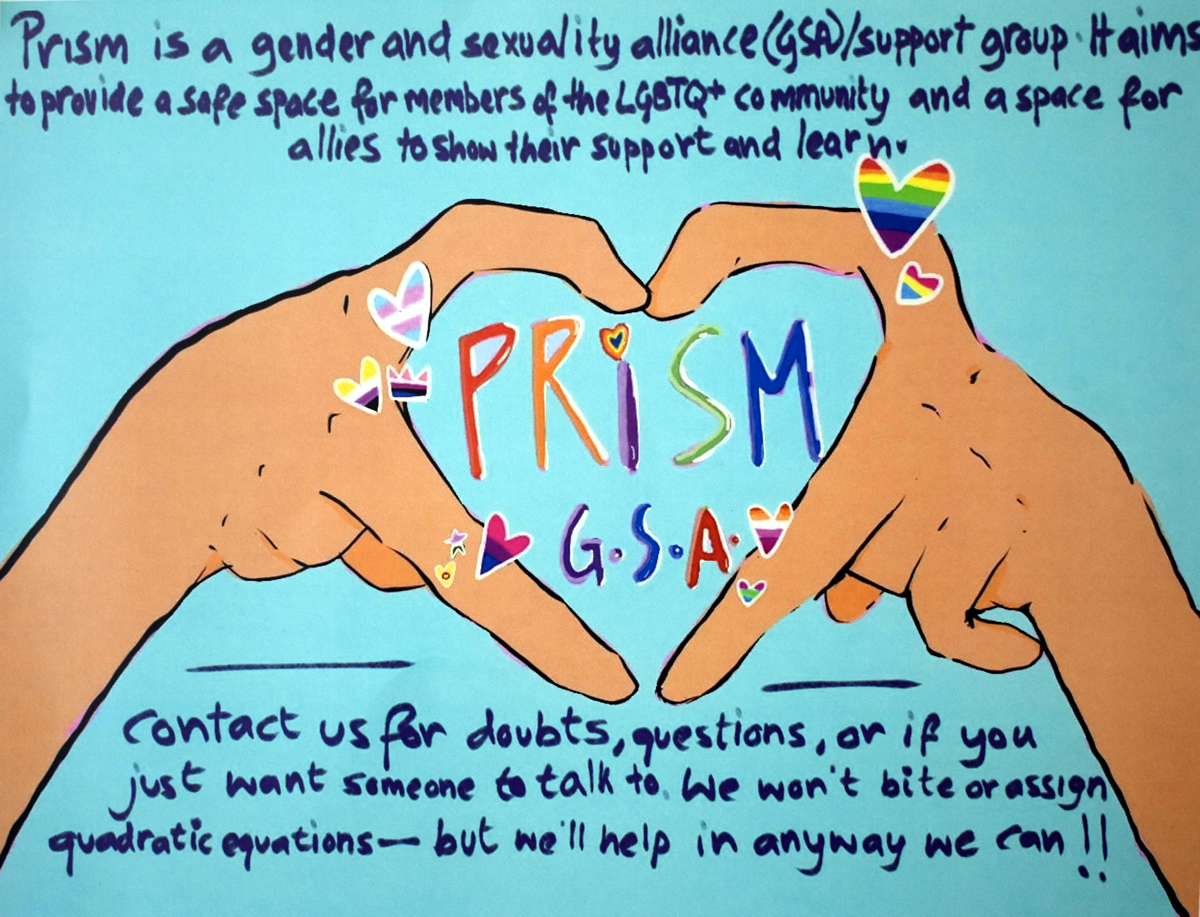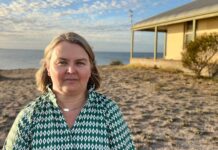KOLKATA, India – A handmade poster appeared on a school noticeboard at the Calcutta International School in Kolkata, the capital city of India’s West Bengal state.
“Prism is a gender and a sexuality alliance. It aims to provide a safe space for the members of the LGBTQ+ community and a space for allies to show support and learn,” it reads. “Contact us for doubts, questions or if you just want someone to talk to. We won’t bite or assign quadratic equations — but we’ll help in any way possible.”

It is one of those rare moments in the country when a school starts a movement to provide visibility for the LGBTQ and intersex community and creates awareness among school-age children.
Sara and Vashudah, who have now graduated from the Calcutta International School, before the pandemic started Prism, a support group that supports and provide safe space to LGBTQ and intersex students.
The group died out because of the pandemic, but it was reborn this year and started to provide a safe space for LGBTQ and intersex students.
Group aims to spread awareness, sensitivity
Prism started with 21 members and is and reached up to 40 members in 2022. Prism members have held one assembly and talked to the students inside and outside of the classrooms without forcing anyone to come out.
“GSA was created to provide safe space to LGBTQ+ students and for those students who want to be an ally. The main goal is to give a feeling of community within school space, where they can open up and explore their identity as well,” said Prism President Abonti Mukherjee while talking to the Washington Blade. “We want to do (assemblies,) sensitize and do workshops with students.”
“This term, we have been able to do one session with eighth graders on allyship and Prism, in general,” added Mukherjee. “We aim to do more because many students are insensitive toward these issues or do not know enough, which makes them hostile toward LGBTQ students. Even for those who are part of community, if they do not have sense of community or supportive teachers or students who can relate to them, it becomes a place where they would not want to come every day, and they do not have accepting home either.”
Mukherjee told the Blade that when the group held an assembly with other students at the school, she realized that many of them are confused and provided politically correct answers about the LGBTQ and intersex community. Mukherjee also said the group gets positive feedback from the students as well.
While talking about her experience, she said that a few high schoolers visited her and showed their willingness to join the group. But according to Mukherjee, the group does not let many students become members because there is concern about those parents who resist such an initiative.
The purpose of the group is to provide a safe space for those students who do not have an accepting home. Mukherjee also talked about a misconception about GSA — that the platform is not a club, but a support group and everyone should be able to join it. She invites any LGBTQ and intersex organization or individual who wants to collaborate with Prism to contact them via Prism’s Instagram page.
Prism has two teachers as advisors.
Abonti said the group in 2023 wants to organize events to spread awareness about same-sex relationships on Valentine’s Day. Archi Shah, Prism’s social media administrator and a member of the group, also talked with the Blade.
Shah said Prism’s main goal is to promote empathy and tolerance, and it’s less about trying to impose a certain ideology. Shah recognizes the group cannot eliminate homophobia overnight in a conservative society, but she believes it is crucial to eliminate the stigma around the LGBTQ and intersex community.
Shah has been a part of Prism as an ally and a member ever since it started when she was in eighth grade.
“I am in charge of the social media page of Prism. We have posters around the school in which we have provided contact of the members, and an Instagram page, they can contact if they have any information or just wants to talk to someone,” said Shah. “This is a very important thing, because not many schools have such things right now.”
Rohani, another Prism member, while talking to the Blade said that she has been a member of the group for the last four years.
She said the idea of forming Prism was to provide a safe space for LGBTQ and intersex children with membership not limited only to LGBTQ and intersex people, but to create a space where all allies can join to provide a sense of safety and acceptance for LGBTQ and intersex students. She also said she was very young when she joined the group and knew nothing about the LGBTQ and intersex community. When Rohani joined the group, however, she tried to extend her support as an ally and learn about the community.
Calcutta International School Principal Tina Servaia told the Blade the inspiration behind Prism arose several years ago when the school learned that some students were struggling with their gender identity and sexual orientation.
“We realized that some of their classmates did not accept them and wanted to change that,” said Servaia. “Inclusion and acceptance is a very important part of our school ethos, and we felt that needed to extend to gender issues as well.”
It is sometimes difficult to make other parents understand these changes because Indian society remains largely conservative, but the Calcutta International School has managed to encourage everyone to support them. Servaia said parents understand Prism is an important part of her school’s culture, and they appreciate it provides students an opportunity to explore their identity and a safe space.
On Feb. 24, 2022, a teenage student of Delhi Public School, a premier private school in India, died by suicide when he jumped off his apartment building.
His mother in the police complaint said he was harassed over his sexuality, but school administrators ignored it. Police later recovered a suicide note in which the teenage boy blamed “the school” and its “higher administration.”
“We do provide counselling services and hold regular sensitization sessions on a variety of topics to educate the school community and create awareness,” said Servaia. “Providing a safe space on its own may not prevent harassment but it needs to be part of a more holistic, consolidated approach consisting of creating awareness, a spirit of acceptance, provision of direct and indirect counselling and creation of a safe space support group.”
Even after Indian Supreme Court on Sept. 6, 2018, struck down the colonial-era law that criminalized homosexuality, the ruling did not change society’s outlook towards the LGBTQ and intersex community. It faced hostility and seeking mental health in the country remains taboo. Many LGBTQ and intersex Indians cannot talk about their sexuality without being humiliated or bullied.
Ankana Dey, a program associate at Sappho for Equality, an organization in Eastern India that works for the rights and social justice of sexually marginalized women and transgender men, spoke with the Blade.
She said that creating a safe space within a school is a step towards social acceptance, social visibility and embracing diversity.
“Although adolescents are vulnerable towards societal pressure, the GSA group, Prism, of Calcutta International school have shown much courage to develop a language of resistance against forced normativity,” said Dey. “It gives us hope to see these students question the imposed structure and challenge the binarized understanding. Nonetheless practicing inclusion by creating a safe collective space within various institutions is a herculean task which the younger generation are ready to take up.”
Although Calcutta International School has created a safe space for LGBTQ and intersex students, the history is not all positive. On Feb. 5, 2018, Avijit Kundu, a mathematics and physics teacher at Calcutta International School, was fired after his autobiography “Amar Shamakami Ejahar” (“My homosexual confession”) came out at the Kolkata International Book Fair.
The school refuted the allegation of homophobia at the time.
“This said, it is important for us to remember that there has been many instances of internal violence within the very premises of Calcutta International School,” said Dey. “It cannot be forgotten how homophobia, transphobia and queerphobia are still ingrained in the mindset of many individuals who hold power and privilege on and of the grounds of various such schools and colleges. The students comprising the GSA group have made a conscious informed decision about making themselves aware of the repercussions that pertain to (the) visibilization of non-normative identities. They are trying to address many misconceptions and stereotypes regarding self-identity which is a very important aspect during the adolescent period. We can only continue to hope that more local schools allow children to make avenues to create a space and discuss their differences in a dignified manner whilst standing by students who fear coming out to their contemporaries.”
Deepa Vasudevan, a representative of Sahayathrika, an LGBTQ and intersex organization based in Kerala state, said safe space is an important first step. Other first step includes visibilizing the spaces to make sure other people know they exist and doing generalized awareness training for school faculties and students.
“I have read that suicide rates for LGBTQIA+ youths go down when there are broader social acceptance and acceptance legal measures like marriage equality,” said Vasudevan. “So, we need to create intervention spaces as a first response, and also work on the broad social level of acceptance and equality.”
Ankush Kumar is a freelance reporter who has covered many stories for Washington and Los Angeles Blades from Iran, India and Singapore. He recently reported for the Daily Beast. He can be reached at [email protected] He is on Twitter at @mohitkopinion.








